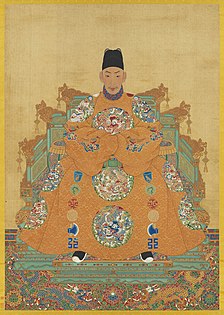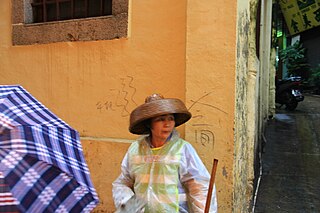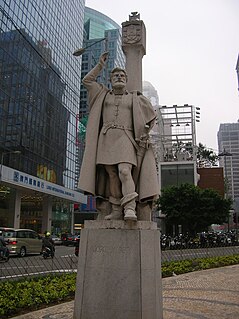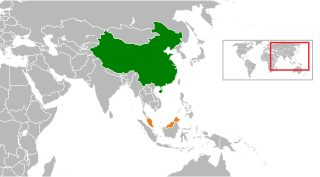
Macau is a Special Administrative Region (SAR) of the People's Republic of China. In 1557 it was leased to Portugal as a trading post in exchange for a symbolic annual rent of 500 tael in order to stay in Macau, it remained under Chinese sovereignty and authority until 1887, the Portuguese came to consider and administer it as a de facto colony. Following the signing of the Treaty of Nanking between China and Britain in 1842, and the signing of treaties between China and foreign powers during the 1860s, establishing the benefit of "the most favoured nation" for them, the Portuguese attempted to conclude a similar treaty in 1862, but the Chinese refused, owing to a misunderstanding over the sovereignty of Macau. In 1887 the Portuguese finally managed to secure an agreement from China that Macao was Portuguese territory. In 1999 it was handed over to China. Macau was the last extant European territory in continental Asia.

Luzon is the largest and most populous island in the Philippines. It is ranked 15th largest in the world by land area. Located in the northern portion of the archipelago, it is the economic and political center of the nation, being home to the country's capital city, Manila, as well as Quezon City, the country's most populous city. With a population of 53 million as of 2015, it contains 52.5% of the country's total population and is the fourth most populous island in the world.

The Malacca Sultanate was a Malay sultanate based in the modern-day state of Malacca, Malaysia. Conventional historical thesis marks c. 1400 as the founding year of the sultanate by King of Singapura, Parameswara, also known as Iskandar Shah from Palembang. but this year of Malacca establishment has been recently revised to be 1262. At the height of the sultanate's power in the 15th century, its capital grew into one of the most important transshipment ports of its time, with territory covering much of the Malay Peninsula, the Riau Islands and a significant portion of the northern coast of Sumatra in present-day Indonesia.
Captain Fernão Pires de Andrade was a Portuguese merchant, pharmacist, and official diplomat under the explorer and Portuguese Malacca governor Afonso de Albuquerque. His encounter with Ming China in 1517—after initial contacts by Jorge Álvares and Rafael Perestrello in 1513 and 1516, respectively—marked the resumption of direct European commercial and diplomatic contact with China. Although de Andrade's mission was initially a success that allowed a Portuguese embassy to proceed all the way to Beijing, relations were soon spoiled by culminating events that led to an extremely negative impression of the Portuguese in China. This included acts of his brother Simão that enraged the Chinese, false reports of the Portuguese being cannibals of kidnapped Chinese children and true reports of their conquest of Malacca, a loyal Ming tributary state. Normalized trade and relations between Portugal and the Ming dynasty would not resume until the late 1540s and the 1557 establishment of Portuguese rule over Macau.

A junk is a type of Chinese sailing ship with fully battened sails. There are two types of junk in China: the northern junk, which developed from Chinese river boats, and southern junk, which developed from Austronesian ship designs used in trade with the Eastern Han dynasty since the 2nd century AD. They continued to evolve in later dynasties, and were predominantly used by Chinese traders throughout Southeast Asia. Similar junk designs were also adopted by other East Asian countries, most notably Japan where junks were used as merchant ships to trade goods with China. They were found, and in lesser numbers are still found, throughout Southeast Asia and India, but primarily in China. Historically, a Chinese junk could be one of many types of small coastal or river ships, usually serving as a cargo ship, pleasure boat, or houseboat, but also ranging in size up to large ocean-going vessel. Found more broadly today is a growing number of modern recreational junk-rigged sailboats. There can be significant regional variations in the type of rig or the layout of the vessel; however, they all employ fully battened sails.

The Zhengde Emperor, who was the 11th Emperor of the Ming dynasty, reigned from 1505 to 1521.

The Port of Singapore refers to the collective facilities and terminals that conduct maritime trade and handles Singapore's harbours and shipping. It is ranked as the top maritime capital of the world since 2015. Currently the world's second-busiest port in terms of total shipping tonnage, it also transships a third of the world's shipping containers, half of the world's annual supply of crude oil, and is the world's busiest transshipment port. It was also the busiest port in terms of total cargo tonnage handled until 2005 when it was surpassed by the Port of Shanghai. Thousands of ships drop anchor in the harbour at all times, connecting the port to over 600 other ports in 123 countries and spread over six continents.

The Tankas or boat people are a sinicised ethnic group in Southern China who have traditionally lived on junks in coastal parts of Guangdong, Guangxi, Fujian, Hainan, Shanghai, Zhejiang and along the Yangtze river, as well as Hong Kong, and Macau. The Boat people are referred to with other different names outside of Guangdong. Though many now live onshore, some from the older generations still live on their boats and pursue their traditional livelihood of fishing. Historically, the Tankas were considered to be outcasts. Since they were boat people who lived by the sea, they were sometimes referred to as "sea gypsies" by both Chinese and British. Tanka origins can be traced back to the native ethnic minorities of southern China known historically as the Baiyue who may have taken refuge on the sea and gradually assimilated into Han culture. However, Tanka have preserved many of their native traditions that are not found in Han Chinese culture.

Jorge Álvares was a Portuguese explorer. He is credited as the first European to have reached China by sea during the Age of Discovery. His starting of settlements on an island in what is now Hong Kong is still considered a significant achievement, "for establishing commercial agreements with the Chinese [and for] maintaining the peace".
Zheng Zhilong, Marquis of Tong'an and Nan'an, baptismal name Nicholas Iquan Gaspard, based on Hokkien childhood nickname It-Kuan (一官; It-Kuan, was a merchant, pirate, political and military leader in the late Ming dynasty who later defected to the Qing dynasty. He was from Nan'an County in Fujian province of China. He was the father of Koxinga, Prince of Yanping, the founder of the pro-Ming Kingdom of Tungning in Taiwan, and as such an ancestor of the House of Koxinga. After his defection, he was given noble titles by the Qing government, but was eventually executed because of his son's continued resistance against the Qing regime.
Wang Zhi, art name Wufeng (五峰), was a Chinese pirate lord of the 16th century, one of the main figures among the wokou pirates prevalent during the reign of the Jiajing Emperor. Originally a salt merchant, Wang Zhi turned to smuggling during the Ming dynasty's period of maritime prohibitions banning all private overseas trade, and eventually became the head of a pirate syndicate stretching across the East and South China Seas, from Japan to Thailand. Through his clandestine trade, he is credited for spreading European firearms throughout East Asia, and for his role in leading the first Europeans to reach Japan in 1543.

Portuguese control of Malacca, a city on the Malay Peninsula, refers to the 130 year period (1511–1641) when it was a possession of the Portuguese East Indies. It was conquered from the Malacca Sultanate as part of Portuguese attempts to gain control of trade in the region. Although multiple attempts to conquer it were repulsed, the city was eventually lost to an alliance of Dutch and regional forces, thus entering a period of Dutch rule.

China–Malaysia relations refers to bilateral foreign relations between the two countries, China and Malaysia.

Luzones was a demonym used by Portuguese sailors in Malaysia during the early 1500s, referring to the Kapampangan and Tagalog people who lived in Manila Bay, which was then called Lusong.

China–Portugal relations, can be traced back all the way to 1514 during the Ming dynasty of China. Relations between the modern political entities of the People's Republic of China and the Portuguese Republic officially began on 2 February 1979. China and Portugal established the comprehensive strategic partnership in 2005.
The Battle of Sincouwaan, also known as Battle of Veniaga Island was a naval battle between the Ming dynasty coast guard and a Portuguese fleet led by Martim Afonso de Mello that occurred in 1522. The Ming court threatened to expel Portuguese traders from China after receiving news that the Malacca Sultanate, a Ming tributary, had been invaded by the Portuguese. In addition, the Portuguese had been purchasing slaves on the Chinese coast, to sell in Portuguese Malacca. Portuguese traders were executed in China and a Portuguese embassy was arrested, with their freedom promised on the condition that the Portuguese returned Malacca to its sultan. Martim Afonso de Mello arrived at the Pearl River but was blockaded by a Ming fleet despite his offers of amends. After two weeks without being able to gain a foothold in China they decided to run the blockade and managed to escape with the loss of two ships and several dozen men. The battle was fought off the northwestern coast of Lantau Island, Hong Kong at a location called Sai Tso Wan today.
The Battle of Tunmen or Tamão was a naval battle in which the Ming imperial navy defeated a Portuguese fleet led by Diogo Calvo in 1521.

Portuguese Macau was a Portuguese colony that existed from the first Portuguese settlement in 1557 to the end of colonial rule and the transfer of sovereignty over Macau to the People's Republic of China in 1999. It constituted of the Municipality of Macau and the Municipality of Ilhas. Macau was both the first and last European holding in China.
Shuangyu was a port on Liuheng Island (六橫島) off the coast of Zhejiang, China. During the 16th century, the port served as an illegal entrepôt of international trade, attracting traders from Japan, Southeast Asia, and Portugal in a time when private overseas trade was banned by China's ruling Ming dynasty. Portuguese sources called the place Liampó, taking the name of the nearby city of Ningbo on the mainland. Shuangyu's days as a smuggling hub and pirate haven began as early as 1524 and lasted until its destruction by the Ming navy in 1548, an event that was greatly exaggerated by the 16th-century Portuguese travel writer Fernão Mendes Pinto.

The djong, jong, or jung is a type of ancient sailing ship originating from Java that was widely used by Javanese and Malay sailors. The word was and is spelled jong in its languages of origin, the "djong" spelling being the colonial Dutch romanisation.














